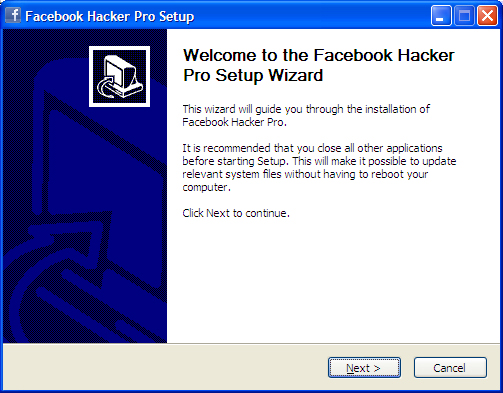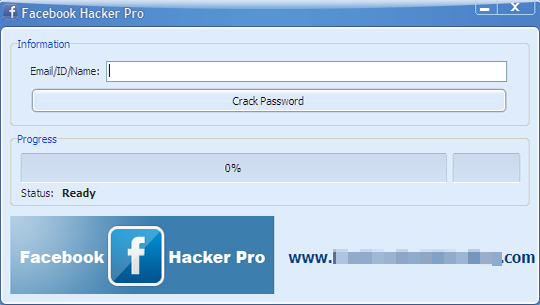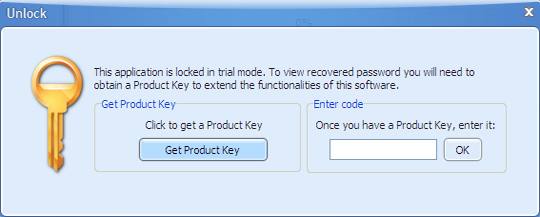SPYW_FAKEHACK
Windows 2000, XP, Server 2003


Threat Type: Spyware
Destructiveness: No
Encrypted: Yes
In the wild: Yes
OVERVIEW
This spyware arrives on a system as a file dropped by other malware or as a file downloaded unknowingly by users when visiting malicious sites.
It executes the files it drops, prompting the affected system to exhibit the malicious routines they contain.
When users agree to buy the software, it connects to a certain URL.
TECHNICAL DETAILS
Arrival Details
This spyware arrives on a system as a file dropped by other malware or as a file downloaded unknowingly by users when visiting malicious sites.
It may be downloaded from the following remote sites:
- http://{BLOCKED}bookhacking.com/FacebookHackerPro_Install.exe
Installation
This spyware drops the following files:
- %Application Data%\Google_Toolbar\Google_Toolbar\1.0.0.0\chrome\background.html
- %Application Data%\Google_Toolbar\Google_Toolbar\1.0.0.0\chrome\google.html
- %Application Data%\Google_Toolbar\Google_Toolbar\1.0.0.0\chrome\manifest.json
- %Application Data%\Google_Toolbar\Google_Toolbar\1.0.0.0\chrome.crx
- %Application Data%\Google_Toolbar\Google_Toolbar\1.0.0.0\chrome.manifest
- %Application Data%\Google_Toolbar\Google_Toolbar\1.0.0.0\chrome.pem
- %Application Data%\Google_Toolbar\Google_Toolbar\1.0.0.0\content\googlebar.js
- %Application Data%\Google_Toolbar\Google_Toolbar\1.0.0.0\content\googlebar.xul
- %Application Data%\Google_Toolbar\Google_Toolbar\1.0.0.0\install.rdf
- %Application Data%\Google_Toolbar\Google_Toolbar\1.0.0.0\MyGoogle.html
- %Application Data%\Mozilla\Firefox\Profiles\1o2kn33k.default\bookmarkbackups\bookmarks-2012-06-05.json
- %User Profile%\Desktop\Facebook Hacker Pro.lnk
- %Start Menu%\Programs\Facebook Hacker Pro\Facebook Hacker Pro.lnk
- %Start Menu%\Programs\Facebook Hacker Pro\Uninstall.lnk
- %Program Files%\HackerPro\Icon.ico
- %Program Files%\HackerPro\License.txt
- %Program Files%\HackerPro\Uninstall.exe
(Note: %Application Data% is the current user's Application Data folder, which is usually C:\Windows\Profiles\{user name}\Application Data on Windows 98 and ME, C:\WINNT\Profiles\{user name}\Application Data on Windows NT, and C:\Documents and Settings\{user name}\Local Settings\Application Data on Windows 2000, XP, and Server 2003.. %User Profile% is the current user's profile folder, which is usually C:\Windows\Profiles\{user name} on Windows 98 and ME, C:\WINNT\Profiles\{user name} on Windows NT, and C:\Documents and Settings\{user name} on Windows 2000, XP, and Server 2003.. %Start Menu% is the current user's Start Menu folder, which is usually C:\Windows\Profiles\{user name}\Start Menu on Windows 98 and ME, C:\WINNT\Profiles\{user name}\Start Menu on Windows NT and C:\Windows\Start Menu or C:\Documents and Settings\{User name}\Start Menu on Windows 2000, XP, and Server 2003.. %Program Files% is the default Program Files folder, usually C:\Program Files.)
It creates the following folders:
- %Application Data%\Google_Toolbar
- %Application Data%\Google_Toolbar\Google_Toolbar
- %Application Data%\Google_Toolbar\Google_Toolbar\1.0.0.0
- %Application Data%\Google_Toolbar\Google_Toolbar\1.0.0.0\chrome
- %Application Data%\Google_Toolbar\Google_Toolbar\1.0.0.0\content
- %Start Menu%\Programs\Facebook Hacker Pro
- %Program Files%\HackerPro
(Note: %Application Data% is the current user's Application Data folder, which is usually C:\Windows\Profiles\{user name}\Application Data on Windows 98 and ME, C:\WINNT\Profiles\{user name}\Application Data on Windows NT, and C:\Documents and Settings\{user name}\Local Settings\Application Data on Windows 2000, XP, and Server 2003.. %Start Menu% is the current user's Start Menu folder, which is usually C:\Windows\Profiles\{user name}\Start Menu on Windows 98 and ME, C:\WINNT\Profiles\{user name}\Start Menu on Windows NT and C:\Windows\Start Menu or C:\Documents and Settings\{User name}\Start Menu on Windows 2000, XP, and Server 2003.. %Program Files% is the default Program Files folder, usually C:\Program Files.)
Other System Modifications
This spyware adds the following registry entries as part of its installation routine:
HKEY_CURRENT_USER\Software\HackerPro
Facebook Hacker Pro = "Facebook Hacker Pro"
HKEY_CURRENT_USER\Software\Microsoft\
Internet Connection Wizard
ShellNext = "http://{BLOCKED}cebookhacking.com/unlock.php "
It adds the following registry keys as part of its installation routine:
HKEY_CURRENT_USER\Software\HackerPro
HKEY_CURRENT_USER\Software\Microsoft\
Internet Connection Wizard
Dropping Routine
This spyware drops the following files:
- %Program Files%\HackerPro\HackerPro.exe - also detected as SPYW_FAKEHACK
- %User Temp%\Toolbar.exe - detected as ADW_PLUGIN
(Note: %Program Files% is the default Program Files folder, usually C:\Program Files.. %User Temp% is the current user's Temp folder, which is usually C:\Documents and Settings\{user name}\Local Settings\Temp on Windows 2000, XP, and Server 2003.)
It executes the files it drops, prompting the affected system to exhibit the malicious routines they contain.
Rogue Antivirus Routine
When users agree to buy the software, it connects to the following URL to continue the purchase:
- http://{BLOCKED}cebookhacking.com/unlock.php
NOTES:
This spyware arrives as an installer of Facebook Hacker Pro, as pictured below:

Once installed, it displays the following windows, prompting the user to enter the Facebook email/ID/name to be accessed:

It then prompts the user to buy a product key for this software:

Users buying the product are redirected to the following site:
- https://{BLOCKED}ank.net/order/orderform.html?time=1338892977&vvvv=70617373726563313031&item=2&affi=omic123
Upon providing a product key, the application is downloaded on the affected user's system. The said application gets passwords stored in the browser cache.
SOLUTION
Step 1
For Windows XP and Windows Server 2003 users, before doing any scans, please make sure you disable System Restore to allow full scanning of your computer.
Step 3
Delete this registry key
Important: Editing the Windows Registry incorrectly can lead to irreversible system malfunction. Please do this step only if you know how or you can ask assistance from your system administrator. Else, check this Microsoft article first before modifying your computer's registry. Before you could do this, you must restart in Safe Mode. For instructions on how to do this, you may refer to this page If the preceding step requires you to restart in safe mode, you may proceed to edit the system registry.
- In HKEY_CURRENT_USER\Software
- HackerPro
- HackerPro
- In HKEY_CURRENT_USER\Software\Microsoft
- Internet Connection Wizard
- Internet Connection Wizard
Step 4
Search and delete these folders
- %Application Data%\Google_Toolbar
- %Start Menu%\Programs\Facebook Hacker Pro
- %Program Files%\HackerPro
Step 5
Search and delete this file
- %User Profile%\Desktop\Facebook Hacker Pro.lnk
Step 6
Scan your computer with your Trend Micro product to delete files detected as SPYW_FAKEHACK. If the detected files have already been cleaned, deleted, or quarantined by your Trend Micro product, no further step is required. You may opt to simply delete the quarantined files. Please check this Knowledge Base page for more information.
Did this description help? Tell us how we did.



